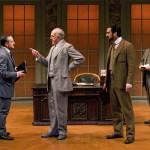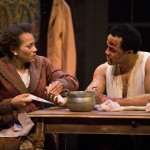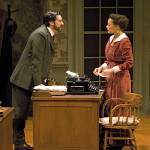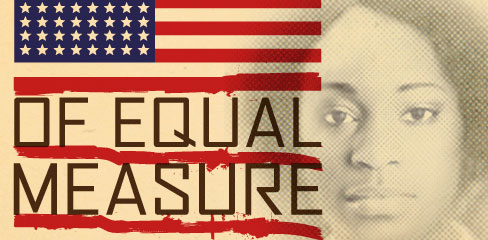Photos by Craig Schwartz
Above, from top: Michole Briana White; J. D. Cullum, Lawrence Pressman, Michael T. Weiss; Lawrence Pressman; Michole Briana White, Christopher O’neal Warren; Micheal T. Weiss, Michole Briana White; J. D. Cullum, T. Ryder Smith.
Excerpts from the reviews
Full reviews are below
“This ambitious tale of the Wilson presidency is well acted, but the plot falters. . . . Tanya Barfield’s drama about the hypocrisy of Woodrow Wilson’s White House as experienced by an African American secretary, lays out an ambitious agenda of ethical, political and racial issues. . . . it sometimes seems as though she hasn’t digested the historical sources informing her unwieldy tale . . . The production, directed by Leigh Silverman, features some sharp acting. Especially memorable are the trio of men who are jockeying for White House power. Michael T. Weiss plays up the more seductive aspects of Christianson’s villainy; J.D. Cullum lends fire (and an Irish brogue) to Tumulty’s moral disgust; and T. Ryder Smith is just plain frightening as Mr. Plank, who casts a menacing shadow on America’s noble idea of itself. . . . ” Charles McNulty, The Los Angeles Times
” . . . stilted dialogue and preposterous plotting . . . crudely manipulative . . . a heavy-handed, snarky style . . . there’s not a fully rounded portrayal to be found among the distinguished cast. . . . ” Bob Verini, Variety
” . . . beautifully achieved . . . In Barfield’s version of the events of the time period, Wilson is an idealist who wants the world to look upon him as a good and principled man, but his private actions are not as high-minded as they appear on the surface, particularly in relation to black integration. In two instances, a sinister torturer, Mr. Plank (a scary T. Ryder Smith), attacks both Wilson’s chief of staff, Joseph Tumulty (JD Cullum), for being Catholic and traitorous and eventually Kingston for leaking secrets to David Leonard (Joseph C. Phillips), a black newspaperman. In Silverman’s hands, they become the most gripping scenes in the play. . . . The cast is uniformly splendid, and the direction taut and briskly achieved. White delivers a bravura performance . . . This play is compelling, and it does what dramatic theater should do—engage the audience in reflection and a desire to be more careful in who we allow to be our leaders. It should be required viewing in order to promote reasoned political discourse.” Melinda Schupmann, ShowMag.com
Publicity
Full reviews
Los Angeles Times, Charles McNulty – This ambitious tale of the Wilson presidency is well acted, but the plot falters.The trouble with historical fiction is that there often isn’t a satisfying amount of either element. Fact constrains fantasy as the helpless past gets reduced to a pencil sketch. “Of Equal Measure,” Tanya Barfield’s drama about the hypocrisy of Woodrow Wilson’s White House as experienced by an African American secretary, lays out an ambitious agenda of ethical, political and racial issues. It also raises (by quaint analogy) the question that has every political pundit’s tongue wagging at the moment — how much compromise of core ideals is acceptable in the march to the Oval Office. But the play, which had its world premiere Friday at the Kirk Douglas Theatre in Culver City, amounts to a set of compelling ideas in need of dramatic shaping. The characters are often fuzzy, the storytelling lacks drive, and there are just too many wrinkles in a badly organized plot. Barfield has thought deeply about her material, but she keeps imposing her insights onto her narrative rather than allowing them to emerge freely. It’s as though she has interpreted her world before constructing it. The fictional character of Jade Kingston (Michole Briana White) is a stenographer on a mission. She lives with her brother, Eugene (Christopher O’neal Warren), in a dilapidated apartment that has neither running water nor electricity. This hardworking woman is determined to obtain these basic conveniences — as well as an affordable chandelier or two when the budget will allow — by making herself indispensable to her employer. Edward Christianson (Michael T. Weiss), Wilson’s backroom advisor, offers Jade a promotion. He claims it’s for her diligence, but he has more nefarious motives. He’s in the process of segregating the White House — a “reorganization” that includes different bathrooms for blacks and whites. It’s a policy that Joseph Tumulty (JD Cullum), the president’s chief of staff (whose influence is waning), sees as a betrayal of the campaign, which won a large share of the African American vote. Christianson knows that Jade will provide an excellent cover for his controversial policies, and being an oddly romantic lech, he will try to take utmost advantage of her personally and professionally. In more ways than one, she’ll be forced to accept what turns her stomach. Barfield doesn’t follow the whitewashed version of President Wilson (a boldly eccentric Lawrence Pressman) most of us were treated to in high school. This is not the eloquent egghead who gloriously championed the League of Nations but a sinister Machiavelli who adopts a ninny’s facade to conceal his role in his administration’s duplicity. Wilson, who enjoys screening D.W. Griffith’s racially abusive “The Birth of a Nation,” sees only what is politically advantageous for him to see. He offers a sly wink at the propaganda machine sounding the drumbeat for war and feigns blissful ignorance of the detention and torture of his enemies, overseen by a diabolical figure named Mr. Plank (T. Ryder Smith). (Parallels between Wilson’s White House and the current one are pointedly suggested throughout.) “Of Equal Measure” includes a broad selection of the domestic and foreign crises that marked Wilson’s presidency. Under the threat posed by secret dealings between an increasingly belligerent Germany and an angry, unstable Mexico, America’s homeland defense grows paranoid.
How this affects racial policy is fascinating, but Barfield doesn’t present her findings with lucid economy. In fact, it sometimes seems as though she hasn’t digested the historical sources informing her unwieldy tale. In playwriting, what’s left out can be just as important as what’s included. Yet Barfield is all too willing to pile private melodrama on top of public turmoil. Jade’s motivations for staying in a job that has become an affront to her conscience are complicated to the point of incoherence. Yes, we see that her story is paradigmatic of an ethical dilemma faced by many African Americans who have ventured close to the country’s ultimate seat of power — in short, how does one negotiate between personal progress and the progress of one’s oppressed community? But the clutter surrounding this conflict blunts the impact. The production, directed by Leigh Silverman, features some sharp acting. Especially memorable are the trio of men who are jockeying for White House power. Weiss plays up the more seductive aspects of Christianson’s villainy; Cullum lends fire (and an Irish brogue) to Tumulty’s moral disgust; and Smith is just plain frightening as Mr. Plank, who casts a menacing shadow on America’s noble idea of itself. As Jade, White may be too dourly mature, but she captures the character’s unyielding sense of dignity. Her portrayal can’t sort out the twists of Barfield’s plot (no one’s could), but we remain sympathetic to Jade’s plight, excusing questionable decisions while we wait to see what else will be plunked down on her plate. Yet it’s a strange experience to be in solidarity with a playwright’s vision while scratching one’s head at how it’s dramatized. 7.14.08
Variety, Bob Verini – In her new play at the Kirk Douglas, Tanya Barfield isn’t content merely to catalog the racism and hypocrisy of Woodrow Wilson’s second term (1917-1921). She’s determined to underline every possible parallel proving the sins of Wilson and G.W. Bush to be “Of Equal Measure,” leading her into stilted dialogue and preposterous plotting for which helmer Leigh Silverman never settles upon an appropriately persuasive style. Result is as crudely manipulative as the World War I-era propaganda Barfield vilifies. Forget the progressive academic and Nobel peace laureate who promoted unions, refined antitrust and spearheaded the League of Nations. This is wholly the revisionist take on Wilson (Lawrence Pressman): the unrepentant Confederate sympathizer who approved segregating a racially mixed Federal government; the “He kept us out of war” candidate who soon sent us Over There, marshalling the era’s media resources — and tossing around disloyalty accusations — to cynically rally the populace. These Wilsonian Achilles heels, both little-known and amply historically documented, might well fascinate within a believable portrait of misapplied power run rampant, especially if the man’s idealistic principles were as much on display as his blind spots. But unable to leave well enough alone, Barfield turns Wilson into a squeaky-voiced, hand-wringing, effeminate tool who pouts about eye irritation and tailors high-flown rhetoric to each sleazy occasion.When revisionism descends to the level of character assassination — even though we know her target’s a president closer at hand — one questions the author’s judgment, at the very least. Then she brandishes a Magic Marker to bring out numerous analogs to current events, from sauerkraut’s new moniker “Liberty Cabbage” — remember Freedom Fries? — to rumors of a Third World “jihad.” Once “our man,” Pancho Villa wants to sabotage oil fields against our investment interests, so now “he’s for terrorism” and approved for liquidation, though he’s “walked right off the map … needle in a haystack.” Remember, “New York’s a target.” Surely the real-life advisers did debate these things, but credibility is undermined by Barfield’s heavy-handed, snarky style. Scribe does no better by her fictional Norma Rae, proud White House typist Jade (Michole Briana White), whose dismay over Wilsonian Jim Crow and office sexual politics radicalizes her into leaking damaging documents. At one point brother Eugene (Christopher O’neal Warren) — a postal worker turned portraitist who wants to be a surrealist; you know the type — begs her to sleep with the boss to save his life, in a Shakespearean twist one might call “Of Equal Measure for Measure.” But nothing comes of Jade’s leaks. Nor is there any dramatic payoff to the numbing cavalcade of White House perfidies, let alone relief from the endless, subtext-free political conversations. Barfield derides Wilson’s sledgehammer sell-the-war effort, but her own rhetorical methods are no more nuanced, especially since the mannered Bushian parallels can’t evoke much more than a tsk-tsk-how-true reaction. Silverman’s staging reinforces the artificiality. Each Oval Office scene is so marked by speechifying and barked repetition (“Unrestricted submarine warfare!” “Unrestricted submarine warfare?”) as to play exactly like a cabinet meeting in “Blazing Saddles,” absent the pacing, variety or jokes. Set changes are muddily utilitarian, projections thrown up on surfaces to no effect. And there’s not a fully rounded portrayal to be found among the distinguished cast. One comes to dread each Pressman entrance with its unvaried, high-pitched dithering. Michael T. Weiss, as Jade’s harassing boss, exudes sinister innuendo that even D.W. Griffith might suggest was over the top. JD Cullum is trapped within his leprechaun accent as Wilson’s liberal conscience Tumulty, while dignity is all White can bring to her hopeless, pointless role. Act two brings on a Kafkaesque knob named Mr. Plank, T. Ryder Smith standing up manfully (if cornily) against character’s symbolic weight in the waterboarding — sorry, interrogation — of Tumulty, to whack all that progressive rubbish out of his head. Exiting after one session, he hisses (as so much herein is hissed), “Verisimilitude.” It’s the play’s most potent if unintended irony, in that verisimilitude and entertainment value are the two qualities it lacks in equal measure.
Curtain Up, Laura Hitchock – “Wilson wants to make the world safe for democracy. What about making America safe for Negroes? — ” Leonard. Tanya Barfield’s historical play commissioned by The Center Theatre Group is an explosive mixture of fact and satire. Set during Woodrow Wilson’s administration, it’s told through the eyes of Jade Kingston (Michole Briana White), an African-American secretary in the White House. Her idealism is tarnished first by the lecherous advances of her boss, Edward Christianson (Michael T. Weiss) and ultimately by the developing segregation policies that reassign all black employees to departments that are gradually abolished. Jade’s journey is a fascinating one, as she fights for the betterment of her younger brother Eugene (Christopher O’neal Warren), an aspiring painter who is thrilled to be promoted to spy against his own people. Directed with spry astuteness by Leigh Silverman, Jade’s personal story alternates with scenes about the White House political machine which includes Wilson (Lawrence Pressman), his Chief of Staff Joseph Tumulty (J. D. Cullum), Secretary of State Robert Lansing (Dennis Cockrum) and Christianson who becomes head of the Committee of Public Information (propaganda). The White House scenes discuss the political issues of the day, particularly the impending World War I. Wilson, idealist, intellectual and Nobel Prize winner, was also a well-documented racist. His government segregation policies were not reversed until the Truman Administration. However, he was never a buffoon and that is a serious flaw in the script. It’s inevitable to compare yesterday’s war administration with today’s and maybe Wilson is not the buffoon Barfield had in mind. The play builds to a powerful ending which contrasts Jade’s personal sacrifice with Wilson’s endorsement of sacrifice “for the betterment of humanity.” The glittering Lawrence Pressman plays the Wilson part as written and it’s a pleasure to watch him in action. Tumulty, a liberal, is vividly played by J. D. Cullum with an impeccable Irish accent. Cocksum wrings honesty out of the beleaguered and bewildered Secretary of State and Weiss cuts a handsome figure as the one-dimensional character he’s given, a racist who oppresses and sexually harasses his secretary Jade while resisting the love he comes to feel for her.
The scene in which Tumulty is imprisoned and beaten by a Mr. Plank seems unlikely but works if viewed as a picture by Barfield of the pressure put on politicians to fall in line. It’s particularly astute when Wilson enters the jail cell, ignores Tumulty’s “Why am I here?” and simply declares he needs him. Jade’s personal story, though it follows a predictable path, holds our attention, largely through the sympathetic power of Michole Briana White’s interpretation. Jade’s home life includes dialogues with her kinsman Leonard (Joseph C. Phillips), a reporter, and her brother Eugene. Leonard is a character written to represent a point of view and doesn’t give Phillips, a capable and charming actor, much to work with. Warren has a better shot as young Eugene, the artist who doesn’t want to be a portraitist and succumbs to the flattery of being a White House spy. Barfield has a sure sense of dramatic suspense even when her content is shaky. She’s very much a writer to watch. 7.11.08
LA Weekly, Lovell Estell III – As America is poised to elect a black man to the White House, Tanya Barfield’s historical drama revisits a time when blacks weren’t even wanted in the building. The action unfolds in the tumultuous reform era of Woodrow Wilson’s presidency, when issues of child labor, women’s suffrage, monopoly domination and the “Negro Question” are roiling the political waters. For Jade Kingston (an unpolished turn by Michole Briana White), there is wary optimism that Wilson (Lawrence Pressman) might advocate for better treatment of blacks. She gets a job as a White House stenographer, but her boss, Edward (Michael T. Weiss), turns out to be a patronizing boor with a perpetual hard-on, who treats her like a glorified domestic. Bitter and disillusioned, she is dragged into chicanery with a black journalist (Joseph C. Phillips), which ultimately lands her on the wrong side of the law. Barfield’s script is surprisingly devoid of insight or depth; depicted here by Barfield and director Leigh Silverman, Wilson is reduced to a doddering old man with an annoying penchant for blustery oratory, a dull sense of humor and bad migraines. A scene that has him cringe while watching scenes from Birth of a Nation is almost absurd. Edward is even more of an airy caricature. The final scene, illuminated by fireworks, is grossly heavy-handed and contrived.
ShowMag.com, Melinda Schupmann – It’s nearly impossible to watch Tanya Barfield’s insightful look at Woodrow Wilson’s administration at the time of World War I without making connections to George W. Bush’s current administration—including his right-hand advisors—and the ill-achieved boggle we find ourselves in today. Certainly Bush is no equal to educationally or intellectually, but the rapidly escalating issues—immigration, a floundering economy, and world-wide unrest—make the two men brothers in world affairs. Barfield focuses on the issues of ‘colored people’ as she introduces us to Jade Kingston (Michole Briana White), a young black woman who has achieved a job in Wilson’s (Lawrence Pressman) White House. Rising from cleaning toilets to this secretarial job has imbued her with the belief that all who struggle have the ability to improve their lot in life. She reveres Wilson for his high-minded claims of equality and programs child labor laws. As she becomes more aware of the inner workings of the presidency, however, she is conflicted by what she learns about ‘Negro’ equality. This is the core of the unfolding story, and it is beautifully achieved by both Barfield and director Leigh Silverman.
Kingston’s first uneasy encounters begin with her boss, Edward Christianson (Michael T. Weiss), who attaches her job security to sexual favors she might do for him. Repellent and small-minded, he also offers to get her weak-willed brother, Eugene (Christopher O’neal Warren), a job: first as an artist, then promoting him as a spy in the black communities who are rioting against the practices of lynching and segregation. In Barfield’s version of the events of the time period, Wilson is an idealist who wants the world to look upon him as a good and principled man, but his private actions are not as high-minded as they appear on the surface, particularly in relation to black integration. In two instances, a sinister torturer, Mr. Plank (a scary T. Ryder Smith), attacks both Wilson’s chief of staff, Joseph Tumulty (JD Cullum), for being Catholic and traitorous and eventually Kingston for leaking secrets to David Leonard (Joseph C. Phillips), a black newspaperman. In Silverman’s hands, they become the most gripping scenes in the play. The cast is uniformly splendid, and the direction taut and briskly achieved. White delivers a bravura performance, and Warren, Cullum, and Pressman are outstanding as the male protagonists. Kathryn Bostic’s original music makes the actions more dramatic and provides tension, particularly during scene changes, enhanced by Adam Phalen’s sound design. Equally important is the lighting design by Lap Chi Chu. As scenes end,characters are isolated in spotlights, allowing the obligatory furniture moving to take place. It also freezes a moment in time.. In both bright and subdued light, the mood is enhanced greatly by his choices. In various moments during the production, Jason H. Thompson adds projected images from Wilson’s term, spotlighting the war that Wilson was so eager to ignore but easily persuaded to declare. Other images of unrest, including D. W. Griffith’s Birth of a Nation’s showing clips of black insurrection, help make a case for Wilson’s views of the changing landscape of America in the early 1900’s. As the story concludes, Barfield has left the audience with much to think about. How factual are the accounts of events in the Wilson White House? Certainly his systematic segregation and then firing of black workers in favor of white was an egregious misdeed that inflamed the black community and set race relations back egregious misdeed that inflamed the black community and set race relations back for many years. It is certainly fictional, but it engenders righteous anger in the audience and provides a blueprint of activities that seem to be carried on and on, even today. As we look ahead to a White House that may be occupied by its first African-American, how will the campaign look as it heats up? How much will we learn historically about the Bush administration’s treatment of prisoners of war and how many deserving candidates were overlooked on the basis of differing political beliefs? This play is compelling, and it does what dramatic theater should do—engage the audience in reflection and a desire to be more careful in who we allow to be our leaders. It should be required viewing in order to promote reasoned political discourse. 7.16.08
Hollywood Reporter, Laurence Vittes – Tanya Barfield’s devastating attack on an iconic president may be too theatrically subtle for its own good.The Center Theatre Group continues its assault on dead American presidents with the world premiere of Tanya Barfield’s mind-bending expose of Woodrow Wilson. Earlier this year at the the Kirk Douglas Theatre, Old Hickory took a lickin’ in Alex Timbers’ “Bloody, Bloody, Andrew Jackson.” Can that notorious bookworm, Millard Fillmore, be next? In presenting a pointedly black take on Wilson, Barfield focuses on the racial policies which set back the cause of black civil rights at the federal level until the Truman administration. It’s customary for whites to see Wilson as an admirable but failed liberal, but the truth paints a less savory picture, and Barfield is right in reopening the case. The subjective fury with which she brutally nails Wilson for his vain, egocentric and vacillating character is the key to how blind she believes the white mainstream can be.
Barfield signals her position by making the three black characters — a White House stenographer (Michole Briana White), her aspiring artist brother (Christopher O’neal Warren) and her noble journalist cousin (Joseph C. Phillips) — the play’s only well-grounded, “normal” characters. The whites, in stark contrast, are either corrupt, cowardly, abusive, or combinations of the three. Barfield seems to be saying that, given such a perspective, you don’t need to make a federal case out of it, that truth will prevail. The downside is that, given the relative obscurity of the history lesson, and the avalanche of detail with which
Barfield and director Leigh Silverman litter the two hours, “Of Equal Measure” may fail to capture the public’s as a theatrical entertainment. It’s a problem compounded by Barfield’s apparent lack of deep personal emotional investment in the characters and the issues beyond their obvious merit, and a lack of convincing relevance to the current Washington scene. The production’s strength is its enthusiastic cast and surface vitality as the action proceeds in a series of staccato episodes, accompanied by increasingly frequent (and distracting) scene changes. Lawrence Pressman busts a gut as a disastrously neurotic President who’s falling to pieces while trying to deal with war at home and abroad and a host of landmark social and financial issues. Ironically, the audience’s sketchy knowledge of the 28th President moves them to laughter when he complains about the severe headaches which presage the stroke that would eventually incapacitate him.
JD Cullum is deeply eloquent as Wilson’s Irish private secretary, Phillips commanding as the heroine’s cousin, and White quietly impressive in a small-scale way as the heroine (her lack of conventional sex appeal is a subtle indicator that her Simon Legree boss is after purely interracial thrills). As her boss, Michael T. Weiss creates an unnervingly ambiguous portrayal. As the brother, Warren simmers with an extraordinary sense of repressed power. As the Secretary of State, a fulminating Dennis Cockrum has to fill in the story line way too much. As a black-garbed secret agent out of Mad magazine’s “Spy vs. Spy,” T. Ryder Smith casts a sinister pall over the hasty, fireworks-enlivened finale. It’s clear that Barfield has an intriguing idea. It’s not clear whether it’s the play or the production that’s not up to the idea. It just may be that “Of Equal Measure” is such a mind-bending look at history that Barfield and Silverman deliberately decided to let the truth sink in on the audience’s ride home in the belief that truth will prevail. 7.14.08
DailyBreeze.com, Jim Farber – ‘Of Equal Measure’ comes up short. One-sided direction, story don’t deliver. I am not offended by the current cover of the The New Yorker with its satiric portrayal of the radicalized Obamas fist-bumping in the Oval Office. But I do find Tanya Barfield’s new play, “Of Equal Measure,” which is receiving its premiere performances at the Kirk Douglas Theatre, offensive. It’s the latest in a long line of agenda-driven dramas to be produced by the Center Theatre Group that doggedly demonize white America while championing the plight of minorities and transforming history into a caricatured humorless political cartoon. Jade Kingston (Michole Briana White) is a hard-working “Negro” stenographer in the Woodrow Wilson White House; a woman who has advanced herself through diligence and hard work. She is honest and idealistic. In fact, all the African-American characters in Barfield’s play are good, honest and idealistic, just as all her white characters are evil, nefarious, disingenuous, conniving, uncaring and racist. It’s the dawn of America’s entry into World War I, and the former peace candidate, President Wilson (played as a flip-flopping nincompoop by Lawrence Pressman) doesn’t have a clue what to do. One moment he’s for keeping America out of foreign wars. The next he wants to fight the war to end all wars. He’s confused about what to do about Pancho Villa and his Mexican revolution, German agitators infiltrating American institutions, and the rash of lynchings that have exploded in the South. All he really wants is a good photo op. All Kingston wants is to do her job, support her family and, whenever possible, buy a little something to improve her life. Those around her, however, are determined to make that impossible. Her boss, Edward Christianson (Michael T. Weiss), is a smarmy presidential insider who is determined to racially segregate all government offices, including the White House, while in somewhat contradictory fashion, transforming Kingston into his personal love toy.
She wards off his advances as best she can, until her live-in brother, Eugene (Christopher O’Neal Warren), who also holds a government job, cajoles her into asking her boss to find him a new position. It’s a quid pro quo with dire circumstances. At the same time Kingston’s cousin, David Leonard (Joseph C. Phillips), a crusading journalist for a black periodical, is urging her to leak sensitive information from within the White House, to “help your people.”
It’s a lose/lose scenario for Kingston, who is played with ardent intensity by White. But as she gradually comes to the realization that the White House is a white man’s den of iniquity and political repression, she gives in and turns into Deep Throat. Justified or not, Barfield is determined to draw as many parallels as possible to the Bush administration and its policies regarding the conduct of a foreign war and the dissolution of civil liberties at home. She even introduces a sinister grand inquisitor, Mr. Plank (T. Ryder Smith), who looks like Count Dracula and has free rein (in time of national emergency) to investigate, incarcerate and brutally torture American citizens. It’s quite possible there is an interesting play to be gleaned from this moment in American history. This one, directed by Leigh Silverman, is not it. Far better you should go see the Los Angeles premiere of “Parade” (at the Neighborhood Playhouse in Palos Verdes), which deals brilliantly with all the same issues at exactly the same moment in America. 7.18.08
Edge Los Angeles, Trevor Thomas – One watches the unfolding of Tanya Barfield’s new play ‘Of Equal Measure’ now onstage at the Kirk Douglas Theater as if through the window of a moving train. The feeling arises not just because too much passes by too quickly. Though Ms. Barfield has crafted a compelling story upon which to hang her indictment of racism in the Woodrow Wilson White House, she never quite gets around to telling it. She takes the audience from Point A to Point B certainly, but in the end one is left with a discomfitting sense of blurriness, as if one hadn’t really gone anywhere at all. Racial equality was not a campaign issue in 1912; the candidates fought over how best to curb the excesses of big business. Democrat Woodrow Wilson, a self-proclaimed Progressive in the mold of his GOP predecessors, Theodore Roosevelt and William Howard Taft, focused his attack on the monopolies over how they ground down the working man. Many African-Americans abandoned the Republican Party for the first time ever in order to support Wilson, and Ms. Barfield conveys their sense of betrayal through her central character, Jade Kingston (Michole Briana White), a White House stenographer of exceptional talent and no small amount of ambition. As the play opens, Jade and her white boss Edward Christianson (Michael T. Weiss), a minor administration official, are compiling a roster of black government officials – a list Jade believes will be used as a sort of honor roll to garner favorable publicity for the administration, but which turns out ultimately to be a list of targets. The married Edward is sexually attracted to her, and she to him to some degree, and this forbidden flirtation begins to grow just as people for whom Jade’s privileged position might be of use begin pressuring her for favors.
Her cousin, journalist David Leonard (Joseph C. Phillips) wants inside information from her. More troubling, Jade’s artistic younger brother Eugene (Christopher O’neal Warren) needs to be rescued from a bad work situation where his race is an issue. Though Jade resists her cousin’s pleas, her devotion to her brother overwhelms caution. She allows herself to be drawn closer to a wildly dangerous liaison with Edward in order to help her brother secure a position on what is meant to be Wilson’s “Committee on Public Information,” the propaganda office of the White House where, in the famous phrase of Edward Bernays, they “engineered consent” for America’s entry into World War I. This is the brilliant heart of Ms. Barfield’s play, a heart she allows to wither away as she bangs back and forth between Oval Office meetings, press conferences, political confabs and other business designed to suggest why Wilson allowed racial segregation to take hold in the White House. She argues that the retreat from the policies of past administrations revolved around America’s entry into the Great War and racist fears that African-American resentments could be exploited by foreign interests to create a fifth column within the government. That’s an enormously complicated thesis; one that requires a substantial investment of time and effort to develop.
Curiously, though the playwright introduces actual Wilson era cabinet officers as characters such as Secretary of State Robert Lansing (Dennis Cockrum) and Chief of Staff Joseph Tumulty (JD Cullum), she misses the true author of the president’s retreat from racial equality, Postmaster General Albert S. Burleson. His presence in her play, dramatically defensible and historically accurate, might have made much of the fruitless exposition unnecessary and allowed her to focus more on her main characters. Instead they’re often waitng in the wings while a lot of complex political folderol unfolds onstage. Quite unnecessarily, Ms. Barfield drags us through the Great War, the Armistice, and even hints at the first Red Scare in the form of the cartoonish Mr. Plank (T. Ryder Smith), a sibilant Gestapo-like villain who drags White House officials down into the basement to beat confessions out of them. And lest we not “get” that Woodrow Wilson (Lawrence Pressman) was insensitive to racial animus, she even has the president happiily screening D.W. Griffith’s “The Birth of a Nation” at night in the Oval Office. Within this tale of politicking and conspiracy, energetically staged by Leigh Silverman, Jade, Edward, and Eugene become as lost as the nameless casualties out on the Western Front. Though we see plenty of them as the story unfolds, they are mere cogs in a machine. In the end when the celebratory fireworks of Armistice Day explode in a nice bit of stagecraft, we are left wondering what ever happened to those interesting people. Perhaps this is the author’s point, that common people blurs and their stories forgotten as the history express whizzes by, but that is the sort of observation best left to epilogues. To have an epilogue, you need a story, and Ms. Barfield ultimately fails to tell us hers. 7.15.08
JoyHog.com, Patrick – In this new play by Tanya Barfield, we center on a quiet but determined young African-American secretary (Jade Kingston) in Woodrow Wilson’s White House. In the opening moments, she is compiling a list of “distinguished” staffers under Wilson. This will be the starting point for the President to begin segregating government offices. Down the hall in the Oval Office, the tension is mounting and the first World War is inevitable. Jade feels blessed to have a steady job where she is respected and has a roof over her head (she lives with her brother, Eugene, who aspires to be a painter). It is when her boss, Edward Christianson inches towards propositioning her, that everything begins to unravel. The war is on, and the majority of government offices are designated to put the right spin and posters on it for the American people, and the slightest straying from conventional patriotism is suspect.
Barfield’s play illuminates a horrifying and very literal picture of America in the early teens. When we first see the setting of the Oval Office with a single desk, it all seems rather uninspired. As we move through the story, however, the minutia is soon layered in: snippets of D.W. Griffith’s “Birth of a Nation,” talk of pulling sauerkraut off the local menus, and more than one tortured government employee. Michole Briana White as Jade is very demur when we first meet her, and her gradual progression – oscillating between what is moral and what is righteous – is a marvel to watch. She is well-complimented by fellow players, Christopher O’Neal Warren (as Eugene) and JD Cullum. Lawrence Pressman as President Wilson and Michael T. Weiss as Christianson seem to be written (and played) with broad strokes, which come right up to the brink of caricature. Nonetheless, this fascinating story and the gravitas of its implications resonate well beyond the walls of the Kirk Douglas. 7.15.08
OutWestArts.blogspot.com, Brian – Guess Who’s Coming to Dinner? A particularly solid 07/08 season is drawing to a close over at the Kirk Douglas Theater in Culver City where Los Angeles’ Center Theater Group is staging the world premiere of Tanya Barfiled’s ‘Of Equal Measure’. Unfortunately, it’s a rather sour note in that this train wreck of a play fails to meet virtually any of its lofty ambitions. It’s a play concerning the struggles of one Jade Kingston, a young African-American woman who has just been promoted within the White House of Woodrow Wilson’s administration in the early 20th century. She is in an increasingly racially polarized environment and fears for her own and other’s futures while her boss decides to make the moves on her. She is conflicted in outright rejecting his advances not only because she wishes to maintain her tenuous position but because she also wants to enlist her boss’ help in protecting her increasingly imperiled brother. It’s not necessarily a bad set up, but hardly an original one. Not only is this a historical play, it is a philosophical and political one. The work is rich with ideas – the fallacy of linear progress in 20th-century civil rights, the competing and intersecting nature of political crises, the power of media to inspire and distract, the personal struggles and sacrifices of families, and the intersection of race and gender politics in the real lives of African-American women. It’s a shame that Barfield’s work seems overwhelmed and unable to address any of these with little more than a gulp and a nervous blank stare. The action shifts stiffly from scene to scene with broken Mamet-like dialog that rarely expresses much. The political conversations often sound as if lifted from the worst episodes of The West Wing. It’s not entirely a loss. A cast of exceedingly talented actors is on hand including Michole Briana White as Jade Kingston, Joseph C. Phillips as reporter David Leonard, and JD Cullum as Joseph Tumulty, one of Wilson’s advisers. Lawrence Pressman plays president Wilson with a rather keen insight. Meanwhile a quite bearish Micheal T. Weiss has the thankless job of playing the cartoonish villain’s role of Edward Christianson, Jade’s boss and erstwhile seducer. But, despite all this talent, the dialog putters along, hopelessly strained – a disappointment to be sure. 7.22.08
Entertainment Today, Brad Auerbach – Tanya Barfield’s ambitious period piece bites off a bit more than the production or audience can chew. The racial discrimination theme is a strong enough underpinning, but added to the mix is sexual discrimination, job-for-sex dilemmas, sibling loyalty, political fealty, women’s suffrage, growing international imperialism and the general fate of the free world. Michole Briana White nobly leads the cast as Jade Kingston, a black secretary in Woodrow Wilson’s White House circa 1914 to 1917. She is offered a promotion, with slightly closer access to the President. Along the way, she is challenged by her boss (Michael T. Weiss) to perform extracurricular favors in order to help her brother Eugene (Christoper O’neal Warren) keep a job.
She is challenged by her cousin journalist (Joseph C. Phillips, often in the best scenes) to aid the plight of the downtrodden black community by ‘observing’ activities in the White House. Also challenged are the President’s aide de camp (the excellent JD Cullum), who suffers improbable physical abuse by a thuggishly intellectual tormentor seeking to ascertain allegiance to the State. There are myriad lynchings argued onstage. Other challenges are presented, which keeps the cast moving about the well-appointed stage and which keep the audience attuned to the swaying power shifts. But soon the intrigues become too thick, at the expense of what could have been a deeper exploration of Jade’s role at the White House and its effect on the wider black community. Lawrence Pressman presents a credible President Wilson, who starts out with the nobility and promise of establishing greater equality for the races, classes and perhaps sexes. But the grinding role of political expediency crushes those aims, and the international threat of a looming war in Europe diverts political capital. The set design by Richard Hoover and Sibyl Wickersheimer moves smoothly and believably between the Oval Office, Jade’s apartment, a restaurant, a movie theatre and a few other locales. Projections by Jason H. Thompson add an intriguing dimension. With a few trims of plot wrinkles, the broader theme of racial and sexual discrimination might have been more powerfully explored. 7.13.08
[previous] [next]
